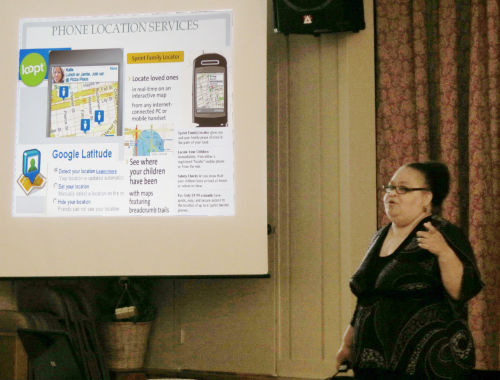
Data Management keeping up with the times
January 29, 2013
Alleged child killer’s competency hearing begins
January 30, 2013Shopping online for a child’s birthday present. Sharing photos from a vacation. Downloading movies. Using Loopt on a cell phone to see if friends are nearby and want to meet up for coffee. Retuning a missed call from a Caller ID list.
Everything is just a click away thanks to modern technology, but there are several darker sides when it comes to the electronic world.
“Technology doesn’t create abuse, but rather a misuse of technology as a tactic to conduct old behavior with new tools,” said Shelia Cole with the Louisiana Coalition Against Domestic Violence. “Everybody uses technology, and we need to know about the technology tactics of stalkers and technology’s impact on confidentially.”
Cole recently conducted a cyber-stalking training seminar in Houma, spreading the word to about 10 social workers, Department of Health and Hospital staff, clinical case workers and law enforcement officers in preparation for National Stalking Awareness Month. Even though Cole’s training event centered on how stalkers use technology, the program also touched on how sharing anything on the Internet could have serious repercussions.
“Watch what you share online,” Cole said. “There is also so much information about us out there that most people don’t know is floating around. Public and private data can be accessed by abusers and perpetrators. The only things safe these days are your medical records because of HIPAA laws.”
Cole cited a murder case from October 1999 where a young woman was murdered after her stalker purchased her employment information from online information broker Docusearch. The man later drove to her place of employment and fatally shot the woman before turning the gun on himself.
“Companies just sell your information,” Cole said. “For $200, this man was able to murder a woman he had been stalking since high school, and her family later sued the company for wrongful death.”
In addition to Internet safety issues brought up by data brokering, spyware, social networking sites, property tax records, data mining and individual and organization websites, Cole also discussed her concern of cell phones with Bluetooth and GPS capabilities, hidden cameras, calling cards, call blocking software and call unblocking software in the hands of a stalker or anyone seeking to find information about another person.
“Each year, we go through training to learn the new tactics stalkers are using to harass victims with technology,” Cole said. “A case of stalking that was featured on the Dr. Phil television show told the story of a woman whose estranged husband had installed a tracking and recording device in her car and a keystroke monitor on her computer. He knew where she was going and heard every conversation she had in her car. The man later served time, but the woman, to this day, does not believe she is truly safe.”
According to statistics from the Stalking Resource Center, more than a million women and almost 400,000 men are stalked each year in the United States. The average duration of being stalked is 1.8 years.
“It’s usually not a stranger, but someone you know and trust,” Cole said. “The statistics are mind-blowing. In 2004, a stalker was convicted for putting a GPS on his ex-wife’s car. He was then forced to wear GPS device for one year. I love that.”
Currently, 14 states classify stalking as a felony on the first offense. Louisiana is one of the 34 states that only classify the crime as a felony upon the second offense and/or when the crime involves aggravating factors.
“The second time may be too late,” Cole said. “There is a big issue of holding abusers accountable. We really need to work on that in Louisiana. We are in the top five states for homicide as a result of domestic violence. We need to start holding them accountable.”
Cole had several suggestions on how to prevent another person from using an electronic device as a tool of stalking and discussed several new and old gizmos perpetrators were using to their advantage.
“Beware of gifts that could have hidden cameras in them, like teddy bears, lamps and even ice chests and cell phones given as gifts,” Cole said. “Be mindful of where you turn your Bluetooth on your cell phone on, like in strange places or the grocery store. Call your cell phone company and have the GPS enabled to 911 only. It’s best to learn about your cell phone. The more you know about your cell phone, the better off you are.”
Despite the potential danger of being tracked by GPS, Cole said that the cell phone ability recently proved to be the possible savior of a woman trying to contact a Baton Rouge women’s shelter.
“The woman was trying to get away from her abusive boyfriend, who was a trucker, and he had her locked in the cab,” she said. “The volunteer who took call was an off-duty law enforcement officer who had the woman’s cell phone tracked. Louisiana State Police later rescued the woman.”
“Caller ID was also a good thing until you could reverse it and find out who called you,” Cole said. “Now there are things called Spoof Cards, a calling card that allows you to program it with a fake name and number and it has the ability to change voice during the call. Think about how scary this is. Spoof also has a Spoof ID program that disables the ability for someone to ‘Spoof’ you. They create a problem and then sell the solution. Trap Call is another program that allows you to unblock the number of a blocked call and record the whole call. Loopt? Great cell phone program for your friends, but not good if not they are your friend.”
Several people in the audience shared some of their not-so-technology-friendly experiences with Cole.
“I had to sit my wife down just recently after she decided to create a Facebook page,” said Houma Police Department Reserve officer Jeff Large. “I had her type just her e-mail address into just one search site, and our family tree, the names of our children, a Google photo of our house the names of some of the credit cards she has two other email addresses she has linked to the original account popped up. She was horrified. It’s just going to keep getting worse.”
Large offered his personal tip to track down any company selling his personal information.
“If I sign up for something that I am not sure about, I sign up with a false middle initial,” Large said. “If stuff starts showing up in my mailbox with that fake middle initial in it, I know my information has been sold, and I call the company. That’s the basis for a civil action lawsuit.”
Like Large’s wife, audience member Heidi Hillery, owner of a local private practice, was also shocked at some of the dangers of modern technology.
“I was surprised at all the cell phone issues,” Hillery said. “I am also amazed how much personal information is out there with this data mining. I think stalking is on the increase, too. It’s important for social workers to keep up with these things to help protect people from domestic violence.”
Shelia Cole with the Louisiana Coalition Against Domestic Violence conducts a training seminar on cyber-stalking in Houma. Cole spoke to about 10 social workers, Department of Health and Hospital staff, clinical case workers and law enforcement officers in preparation for National Stalking Awareness Month.









